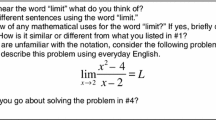Abstract
This paper reports a teaching experiment in which two students engaged in tasks that challenged them to describe a final state for a variety of infinite iterative processes. The results from the study indicate that the students used multiple reasoning strategies for addressing these tasks. Refinements in the students’ reasoning occurred as students constructed relationships between the problems they were solving and problems they had solved previously, applying some of the reasoning strategies that they used for one problem to make sense of or solve another problem. We discuss how these findings relate to the existing body of research on infinite iterative processes.

Similar content being viewed by others
Notes
We decided to work with mathematics undergraduate students to ensure that the participants had a certain maturity regarding proof techniques and because a mathematics student would have already been exposed to a wide variety of mathematical concepts, which gave us more mathematical contexts to choose from for our task variations.
We worked only with two students at a time in order to be able to closely follow each student’s reasoning, both during each session and later during data analysis.
All student names are pseudonyms.
All tasks used in this study (and proposed solutions) can be found in the Appendix, which is part of the electronic version of the article and can also be accessed at http://rci.rutgers.edu/~khweber/radu_esm_tasks.pdf.
In all the geometrical construction tasks, the process was defined in such a way that any intermediate state was included in the subsequent one (so \( {S_0} \subseteq {S_1} \subseteq ... \subseteq {S_n} \subseteq ... \)).
An interesting question that can be considered for future research is whether these students’ refinements in their reasoning on infinite iteration constitute procedural or conceptual changes in their knowledge. We note that before being able to address such a question, it will be necessary to further develop the theoretical ground with respect to what type of reasoning constitutes a procedural or conceptual approach, respectively, when reasoning about infinite iteration.
For a more detailed discussion of APOS with respect to constructing infinite iteration processes, see Radu (2009).
References
Brown, A., McDonald, M.A.,& Weller, K. (2008). Step by step: Infinite iterative processes and actual infinity. In F. Hitt, D. Holton, P. Thompson (Eds.), Research in Collegiate Mathematics Education VII. Providence: Amer. Math. Soc
Cobb, P., Confrey, J., deSessa, A., Lehrer, R., & Schauble, L. (2003). Design experiments in educational research. Educational Researcher, 32(1), 9–13.
Confrey, J., & Costa, S. (1996). A critique of the selection of “mathematical objects” as central metaphor for advanced mathematical thinking. International Journal of Computers for Mathematical Learning, 1, 139–168.
Dubinsky, E., Weller, K., Mcdonald, M. A., & Brown, A. (2005). Some historical issues and paradoxes regarding the concept of infinity: An APOS analysis: Part 2. Educational Studies in Mathematics, 60, 253–266.
Dubinsky, E., Weller, K., Stenger, C., & Vidakovic, D. (2008). Infinite iterative processes: The Tennis Ball Problem. European Journal of Pure and Applied Mathematics, 1(1), 99–121.
Ely, R. (2007). Nonstandard models of arithmetic found in student conceptions of infinite processes. In T. Lamberg, & L. R. Weist (Eds.), Proceedings of the 29th Annual Conference of the North American Chapter of the International Group for the Psychology of Mathematics Education (pp. 116–119). Stateline (Lake Tahoe), NV: University of Nevada, Reno.
Falk, R., & Ben-Lavy, S. (1989). How big is an infinite set? Exploration of children's ideas. In S. Vergnaud, G., J. Rogalski, & M. Artigue (Eds.), Proceedings of the Thirteenth Annual Conference of the International Group for the Psychology of Mathematics Education 1 (pp. 252–259). Paris: G. R. Didactique.
Fischbein, E. (1963). Conceptele figurale. Bucuresti: Editura Academiei R.S.R.
Fischbein, E., Tirosh, D., & Hess, P. (1979). The intuition of infinity. Educational Studies in Mathematics, 10(1), 3–40.
Gravemeijer, K. (1998). Developmental research as a research method. In A. Sierpinska & J. Kilpatrick (Eds.), Mathematics education as a research domain: A search for identity (pp. 277–296). The Netherlands: Kluwer.
Lakoff, G., & Núñez, R. E. (2000). Where mathematics comes from: How the embodied mind brings mathematics into being. New York: Basic Books.
Mamolo, A., & Zazkis, R. (2008). Paradoxes as a window to infinity. Research in Mathematics Education, 10(2), 167–182.
Piaget, J., & Inhelder, B. (1956). The child’s conception of space. London: Routledge & Kegan Paul.
Radu, I. (2009) To infinity and beyond: Toward a local instruction theory for completed infinite iteration. Doctoral dissertation, Rutgers University, New Jersey, USA. http://hdl.rutgers.edu/1782.2/rucore10001600001.ETD.000051893. Accessed 1 Apr 2011.
Radu, I., & Weber, K. (2011) Formalizing the state at infinity of completed infinite iteration (in press)
Stenger, C., Vidakovic, D., & Weller, K. (2005) Student’s conceptions of infinite iteration: A follow-up study. Presented at the SIGMAA on RUME conference, Phoenix, AZ, February 24–27.
Tall, D. (1980). The notion of infinite measuring number and its relevance in the intuition of infinity. Educational Studies in Mathematics, 11(3), 271–284.
Tirosh, D., & Tsamir, P. (1996). The role of representations in students’ intuitive thinking about infinity. International Journal of Mathematics Education in Science and Technology, 27, 33–40.
Wagner, J. F. (2006). Transfer in pieces. Cognition and Instruction, 24(1), 1–71.
Wheeler, M. M., & Martin, W. G. (1988). Explicit knowledge of infinity. In M. Behr, C. Lacampagne, & M. M. Wheeler (Eds.), Proceedings of the Tenth Annual Conference of the North American Chapter of the International Group for the Psychology of Mathematics Education (pp. 312–318). DeKalb, IL.
Author information
Authors and Affiliations
Corresponding author
Additional information
An erratum to this article can be found at http://dx.doi.org/10.1007/s10649-011-9332-3
Electronic supplementary material
Below is the link to the electronic supplementary material.
ESM 1
(PDF 105 kb)
Rights and permissions
About this article
Cite this article
Radu, I., Weber, K. Refinements in mathematics undergraduate students’ reasoning on completed infinite iterative processes. Educ Stud Math 78, 165–180 (2011). https://doi.org/10.1007/s10649-011-9318-1
Published:
Issue Date:
DOI: https://doi.org/10.1007/s10649-011-9318-1




